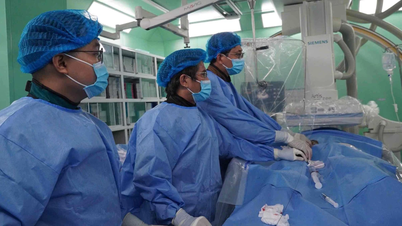Milk is a food with high nutritional value, containing enough protein, lipid (fat), carbohydrate (sugar), vitamins and minerals to help the body develop healthily; it is a good source of nutrition for all ages, even for people with chronic diseases such as diabetes and kidney failure.
However, according to Master, Doctor Pham Thi Thanh Huyen, Department of Adult Nutrition Consultation, Institute of Nutrition, if using milk that does not ensure quality or is not suitable for the medical condition, it can cause serious harm.
For people with diabetes, using milk that does not guarantee quality such as milk containing high sugar content can increase blood sugar quickly, causing loss of blood sugar control, increasing the risk of complications of the disease. Or using milk containing a lot of saturated fat increases insulin resistance, making it difficult to control the disease...
In addition, poor quality milk also has the potential to contain unsafe additives and sweeteners or exceed the permitted level, which can also negatively affect the body's metabolic function.
For people with kidney failure, a diet that controls protein, potassium, and phosphorus is important to reduce the burden on the kidneys. Non-standard milk or milk that is not suitable for the medical condition may have high levels of protein, potassium, and phosphorus, causing the kidneys to work too hard to excrete them. Increasing protein intake will increase blood urea, causing kidney failure to progress faster. If the patient uses poor quality milk that contains a lot of potassium, the kidneys will not be able to excrete it in time, leading to dangerous heart rhythm disturbances.
Milk contains a lot of phosphorus, which puts people with kidney failure at risk of vascular calcification, eye damage, and cardiovascular complications. The long-term consequences of using poor quality milk in people with kidney failure will make the disease worse, making the kidneys unable to recover, leading to the patient having to undergo dialysis and developing additional complications (anemia, osteoporosis, kidney-related heart disease, etc.).
Thus, for people with the above chronic diseases, choosing the wrong milk or using milk that does not guarantee quality not only does not alleviate the disease but can make the disease worse, causing complications to appear sooner.
 |
Authorities have just discovered two businesses producing fake milk on a large scale. (Photo: nhandan.vn) |
Nutritionists recommend that before buying dairy products, you should: choose milk with a clear origin and full safety certification (absolutely do not use milk of unknown origin); read the label carefully before use; depending on each medical condition, you should consult a doctor or nutritionist before choosing the right type of milk.
Dr. Bui Thi Thuy, Department of Adult Nutrition Consultation, Institute of Nutrition, noted that for people with chronic diseases such as diabetes, high blood pressure and kidney failure, choosing the right type of milk needs to be carefully considered to avoid negative effects on the treatment process and overall health of the patient.
For diabetes, the main nutritional goal is to control stable blood sugar, avoid post-meal hyperglycemia and support effective energy metabolism. Therefore, when choosing milk, priority should be given to specialized milk for people with diabetes, with a low glycemic index (low GI), which helps slow down the absorption of sugar into the blood; avoid milk containing refined sugar, syrup, maltodextrin, or sweeteners that can easily cause hyperglycemia; choose products containing soluble fiber such as inulin or FOS to help improve intestinal microflora and better control glucose.
For kidney failure, the nutritional goal is to reduce the metabolic load on the kidneys, control the amount of protein, phosphorus, potassium and sodium in the diet. Therefore, it is necessary to choose milk specifically for kidney patients, often with a special formula: low protein content but high biological value, potassium, phosphorus and sodium levels are tightly controlled. Avoid milk with added vitamin D and calcium if the patient already has hypercalcemia; prioritize choosing milk that is high in energy (high in calories) but does not cause an increase in electrolyte load.
Patients should only use as directed by a nutritionist or treating physician; perform regular tests to monitor kidney function and adjust milk intake if necessary. Patients on hemodialysis or peritoneal dialysis have different nutritional needs and need to individualize their diet, including milk selection.
Dr. Bui Thi Thuy also gave some advice to people with underlying diseases when using nutritional products. Accordingly, it is necessary to carefully read the nutritional ingredients on the product packaging, pay attention to the content of sugar, protein, fat, sodium, potassium, phosphorus and other micronutrients; should consult a health expert; balance energy from milk with other sources in the diet to avoid excess energy, especially for people who are overweight or obese; regularly check biochemical and health indicators to have appropriate adjustments in the type of milk and the amount used.
Milk is just one food in a varied, healthy diet that is important for people with underlying diseases, helping to support treatment, increase resistance and improve quality of life.
However, choosing the right type of milk, nutritional products, using them properly and monitoring them regularly are prerequisites to ensure safety and effectiveness. Close coordination between patients, doctors and nutritionists will help optimize the benefits of milk products, while minimizing possible risks.
Source: https://nhandan.vn/sua-kem-chat-luong-gay-hai-nghiem-trong-cho-nguoi-mac-benh-man-tinh-post873061.html




![[Photo] Prime Minister Pham Minh Chinh works with the Standing Committee of Thai Binh Provincial Party Committee](https://vphoto.vietnam.vn/thumb/1200x675/vietnam/resource/IMAGE/2025/5/12/f514ab990c544e05a446f77bba59c7d1)
![[Photo] Prime Minister Pham Minh Chinh receives Swedish Minister of International Development Cooperation and Foreign Trade](https://vphoto.vietnam.vn/thumb/1200x675/vietnam/resource/IMAGE/2025/5/12/ae50d0bb57584fd1bbe1cd77d9ad6d97)
![[Photo] Prime Minister Pham Minh Chinh starts construction of vital highway through Thai Binh and Nam Dinh](https://vphoto.vietnam.vn/thumb/1200x675/vietnam/resource/IMAGE/2025/5/12/52d98584ccea4c8dbf7c7f7484433af5)















![[Photo] Prime Minister Pham Minh Chinh receives Swedish Minister of International Development Cooperation and Foreign Trade](https://vphoto.vietnam.vn/thumb/402x226/vietnam/resource/IMAGE/2025/5/12/ae50d0bb57584fd1bbe1cd77d9ad6d97)
![[Photo] Prime Minister Pham Minh Chinh works with the Standing Committee of Thai Binh Provincial Party Committee](https://vphoto.vietnam.vn/thumb/402x226/vietnam/resource/IMAGE/2025/5/12/f514ab990c544e05a446f77bba59c7d1)



































































Comment (0)